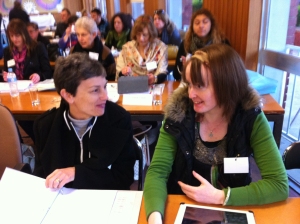Live it!
Reflections of my learnings
The four days that we spent in Geelong were undoubtedly the most valuable professional development I have experienced. And for me, some of the most valuable moments in those four days came out of the conversations that I had with the teachers we met. For example, on the second morning, I went out for a run at 6am with some of the other teachers there, including a teacher from Geelong. He made the comment that from his experience of the implementation of Positive Psychology at Geelong Grammar, he felt that training groups of teachers together and also forging connections with our feeder primary schools was an extremely valuable step in our journey. In his opinion, the relationships that we were building, and the common language that we were forming would make a far greater difference to our school, our students and our community than any strategies or interventions made without that behind them. That was a real ‘light bulb moment’ for me. Although I was taken by the idea of positive psychology when I attended the first lecture by Professor Martin Seligman early last year, and have been keen to take up every opportunity to develop my understanding in the area since then, it has been with the catch cry ‘give me strategies to implement this in my classroom’. In looking for the ways this applies to my Maths and Science classes I have been entirely focused on strategies. My four days in Geelong changed this for me. To effectively implement this in our school we as teachers need to live it. Its most powerful use is in our daily interactions and conversations with our students, and with each other. Worksheets and classroom activities will only be effective with the force of our example and those hundreds of little conversations behind them, giving them conviction.
Since coming back from Geelong my focus has been on teaching my Maths classes the power of self-talk, and how a growth mindset can help them to value challenges. How many of us have said ‘I can’t do Maths’, or ‘I can’t spell’, or ‘I’m no good at sports?' Neuroscience tells us that you’re wrong. Your only limit is the one you set for yourself. Change your self-talk; ‘I can’t understand quadratics….YET’. And to everyone out there talking to the young people in your life, let’s stop spreading the smart/stupid myth. We praise people for being ‘really smart’ when they succeed, but what does that really mean? Commend them for the effort they put in, and encourage them to continue to challenge themselves, and then maybe we’ll get to see just how awesome they can be.
Amanda and a colleague at the Geelong Grammar Training


